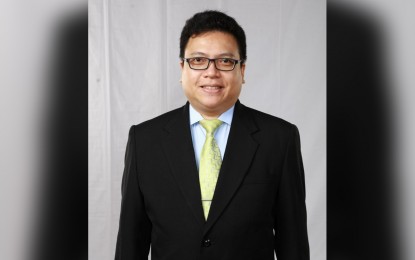
EXTERNAL FACTORS. An economist attributes losses of the local bourse's main gauge primarily to external factors, such as the Federal Reserve's key rate hikes and the war between Russia and Ukraine. Rizal Commercial Banking Corporation (RCBC) chief economist Michael Ricafort said investors are monitoring election-related developments in the country and are waiting for the incoming administration's policies and the members of its Cabinet. (Photo from RCBC)
MANILA – Volatility on account of external developments continues to largely dampen sentiments in the local financial markets, an analyst said.
Rizal Commercial Banking Corporation (RCBC) chief economist Michael Ricafort, in a reply to e-mailed questions from the Philippine News Agency (PNA), said the decline in the Philippine Stock Exchange index (PSEi) is lesser compared to, among others, the US stocks market.
A day after the May 9 local and national polls, the PSEi lost 38.97 points to 6,720.93 points. It further slipped Wednesday by 1.27 percent, or 85.07 points, to 6,635.86 points.
“Thus, external risk factors that are exogenous in nature (or beyond the country's reasonable control) continue to have a bigger effect/impact on the local financial markets,” he said.
Ricafort identified these factors as the higher volatility in the global financial markets due to more aggressive hikes in the Federal Reserve rate “that could lead to economic slowdown and some potential risk of recession”, the impact of Russia's invasion of Ukraine since last February that “led to higher prices of global oil/energy/other commodities that could add to elevated inflation”, and concerns on the lockdowns in China “that could also slow down the global economic recovery prospects.”
With respect to the election in the Philippines, he said “as a matter of prudence, investors would be closely monitoring if the elections would be clean, honest, credible and peaceful, as an important first step/part of the democratic process.”
Citing reports, Ricafort said the Armed Forces of the Philippines (AFP) considered last Monday’s election as generally peaceful.
“The next step would be to evaluate the incoming president’s/administration’s platforms/policies/reforms for the first 100 days, especially the members of the Cabinet/economic team (some wait-and-see attitude, as a matter of prudence, while waiting for details in the coming days/weeks),” he added.
Ricafort said among the key measures that the new administration can do to help sustain the economy’s recovery and to attract more investments into the country include credible/competent economic team which what has been observed over the past 10 to 20 years; implementation of policies that promote the environment, society, governance (ESG) to help attract more investments; strengthening of institutions; rule of law; and more effective response against the impact of the pandemic.
He also cited the need to focus on economic recovery measures like the further reopening of the economy, creation of more jobs, improving the government’s fiscal position, increasing infrastructure spending, continuation of economic and fiscal reforms, promotion of greater inclusion/unity among politicians, and improved diplomatic relations with the biggest trading partners and sources of foreign investments. (PNA)
